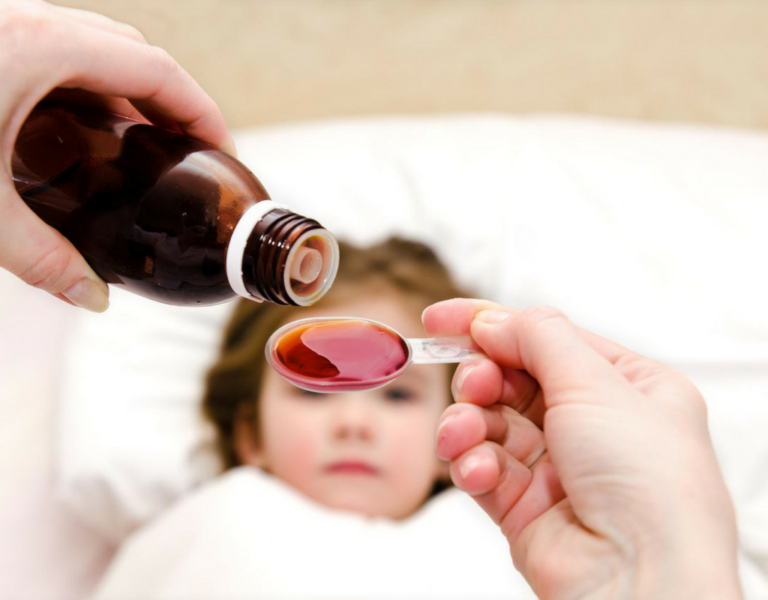June is National Safety Month. This year especially, safety is on the top of every parent’s mind. We’ve compiled a list of 8 key areas of concern and how you can safeguard your children this summer.
1. COVID-19
The COVID-19 pandemic is still active in our area. As restrictions loosen and more people are out, it’s important to maintain safe practices to avoid infection. We still recommend taking precautions, including mask use when appropriate along with frequent hand washing.
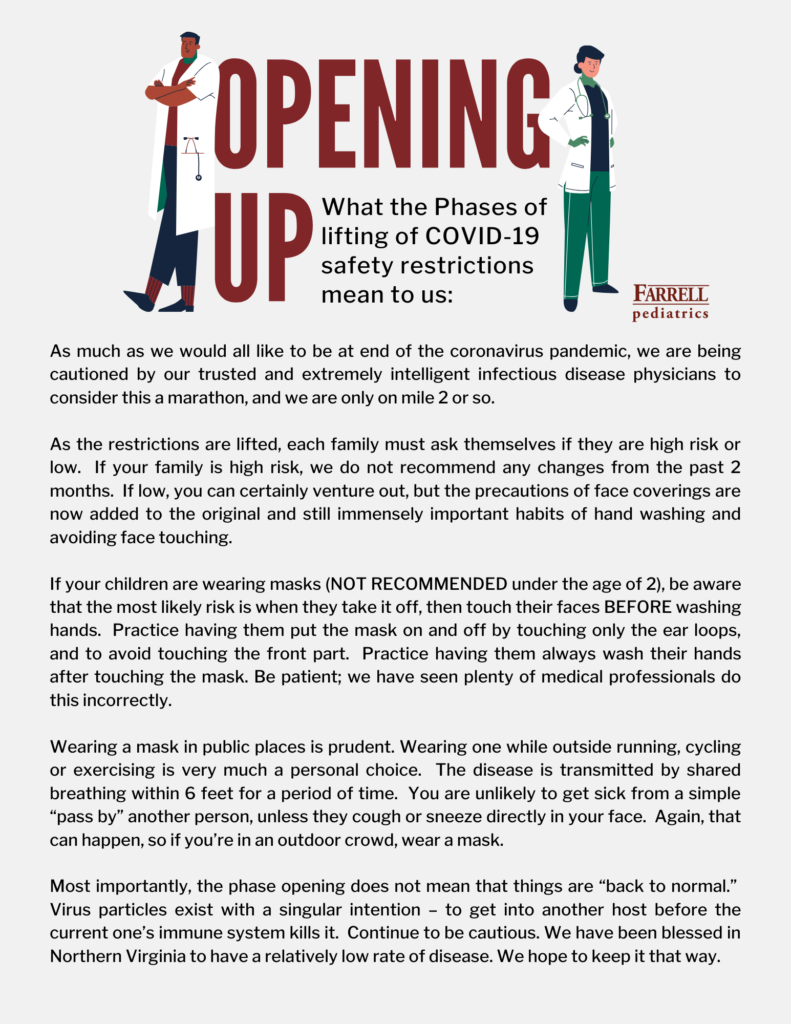
2. HEAT
Limit activities in the sun to help protect against heat exhaustion and sunburn, especially during the hours of 10am and 2pm when the sun is the strongest. Always apply sunscreen of SPF30 or higher, and reapply every two hours and after swimming. Seek shade when it’s available and know the signs of heat exhaustion and heat stroke.
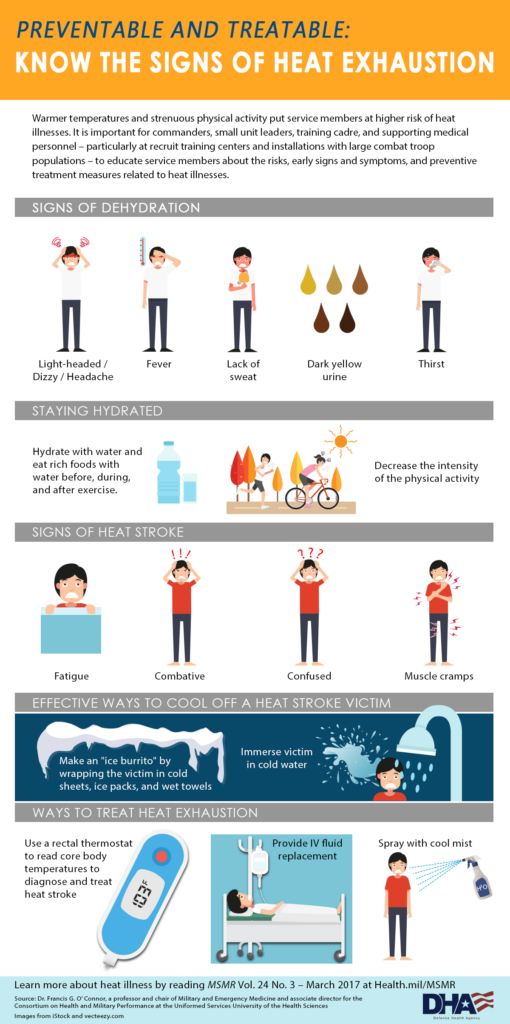
3. PLAY
Both children and adults should always wear a helmet while biking, horseback riding, skating, or climbing. Helmets should cover the forehead and sit on the head, and should be tight enough that no more than two fingers can sit between the chin and the strap. Wear appropriate attire and safety gear during other outdoor activities.
Check playground equipment. It can become uncomfortably or even dangerously hot, especially metal slides, handrails, and steps. Leave bikes, backpacks, and bags away from the equipment and the play area so that no one trips over them. Never allow children to push or roughhouse while on jungle gyms, slides, seesaws, swings, and other equipment. Teach them to use the equipment properly — slide feet-first, don’t climb outside guardrails, no standing on swings, etc.
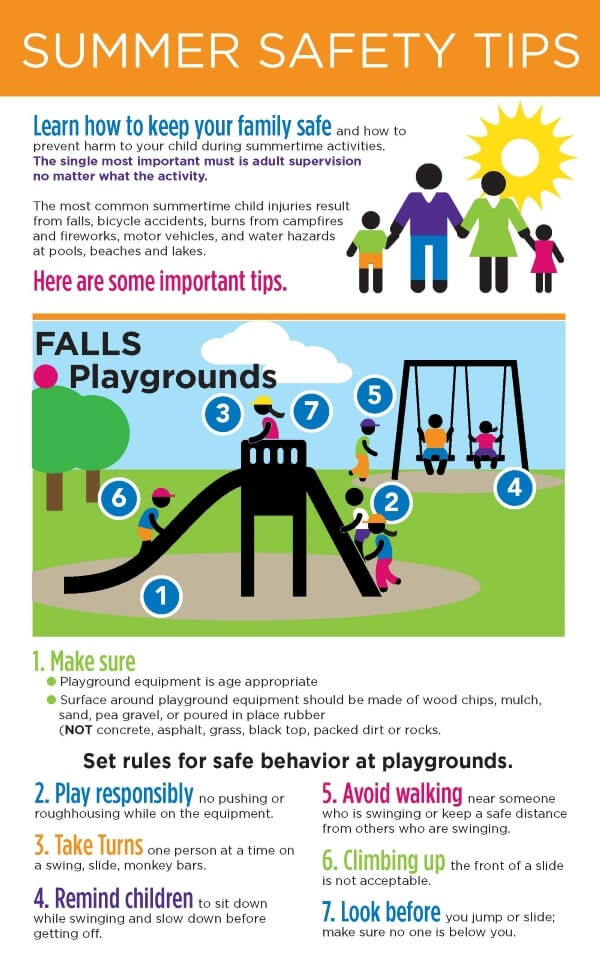
4. CARS
Distracted driving increases in the summer. Always wear a seatbelt and secure children in car/booster seats. Turn off your cell phone, or put it in “driving mode.” Never text while driving.

NEVER LEAVE A CHILD ALONE IN A VEHICLE. Even a few minutes can be deadly as temps rise quickly and children are more susceptible to heat stroke. Leaving the car windows open or cracking them open does not allow enough air into the vehicle. While tempting, don’t leave children alone with the engine running, even if the A/C is on. This creates a fall risk with power windows, along with the risk that your child may try to emulate your driving and release the emergency brake. A rolling vehicle could cause harm to your child, pedestrians and other motorists.
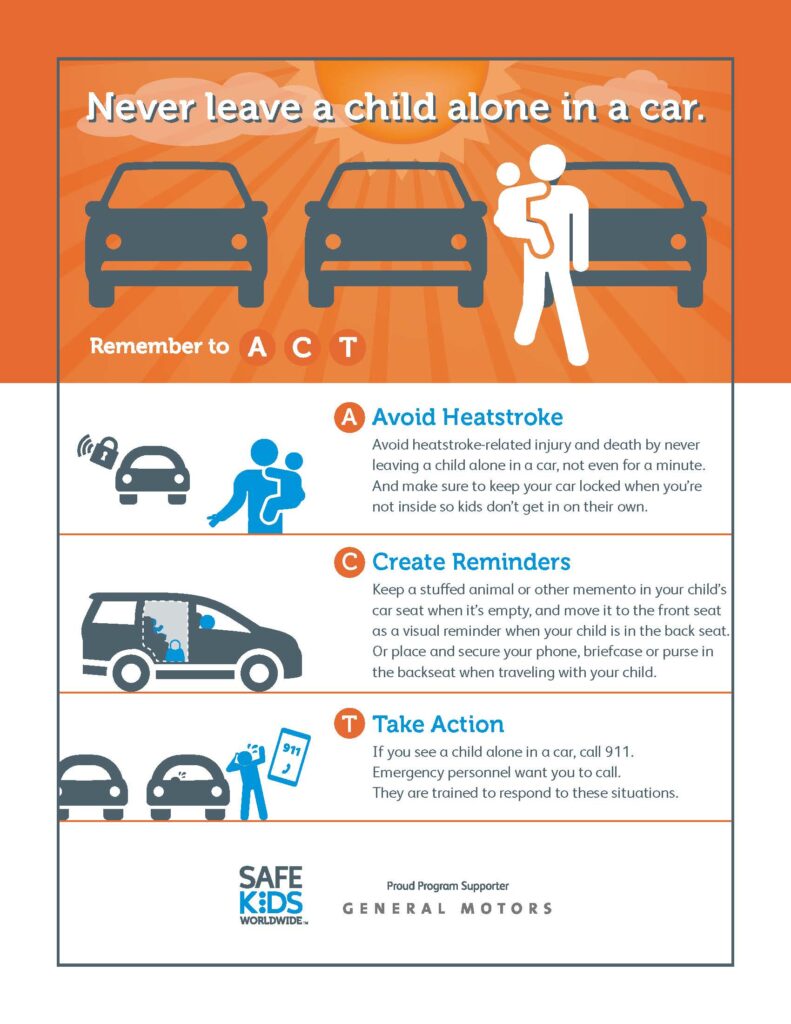
5. WATER
According to the Consumer Product Safety Commission (CPSC), drowning remains the number one unintentional cause of death for children in the U.S. ages 1 to 4, and the second leading cause among children ages 5 to 14. First and foremost, teach children to swim. But even strong swimmers can run into trouble, so never leave a child alone near water, even for a moment. Keep small children and poor swimmers within arms reach at all times. Don’t rely on “floaties” or other flotation devices– these give parents a false sense of security. Ocean swimming should only be allowed when a lifeguard is on duty. Teach children about rip currents and to never swim in fast-moving water. Always wear a life vest on a boat, jet ski, and in a kayak/canoe.
VIEW MORE SUMMER WATER SAFETY TIPS ON OUR BLOG
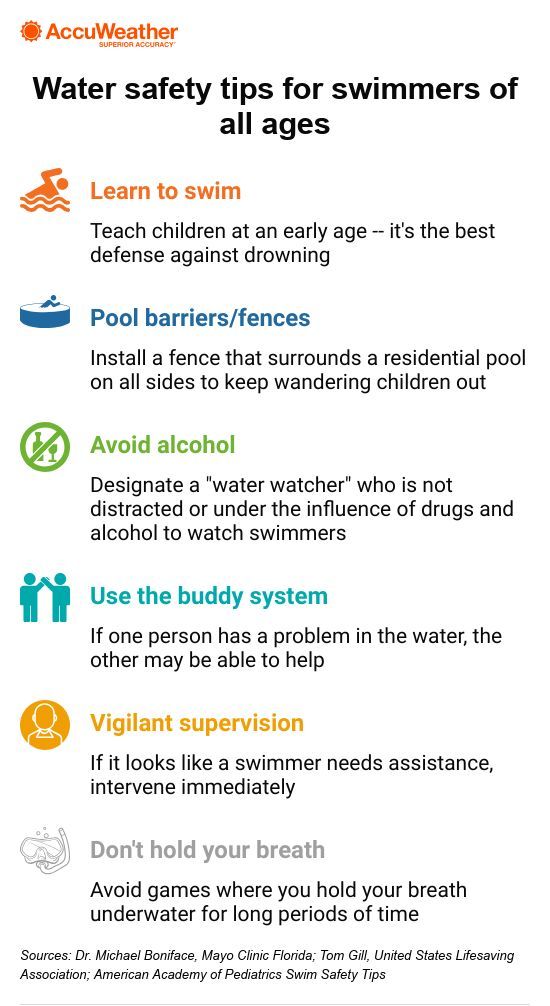
6. HYDRATE
Encourage your child to drink plenty of water throughout the day, and more when they’re playing out in the sun. Say no to sports drinks and soda, which are loaded with sugar and may contain caffeine, which acts as a diuretic.
It’s important to make sure your child drinks water before he or she is really thirsty. Thirst is a sign that your child is already dehydrated. Fill younger kids sippy cups with water or milk. If you do give them juice, dilute it with water. For older kids, get them a fun water bottle and encourage them to drink and refill it multiple times throughout the day.
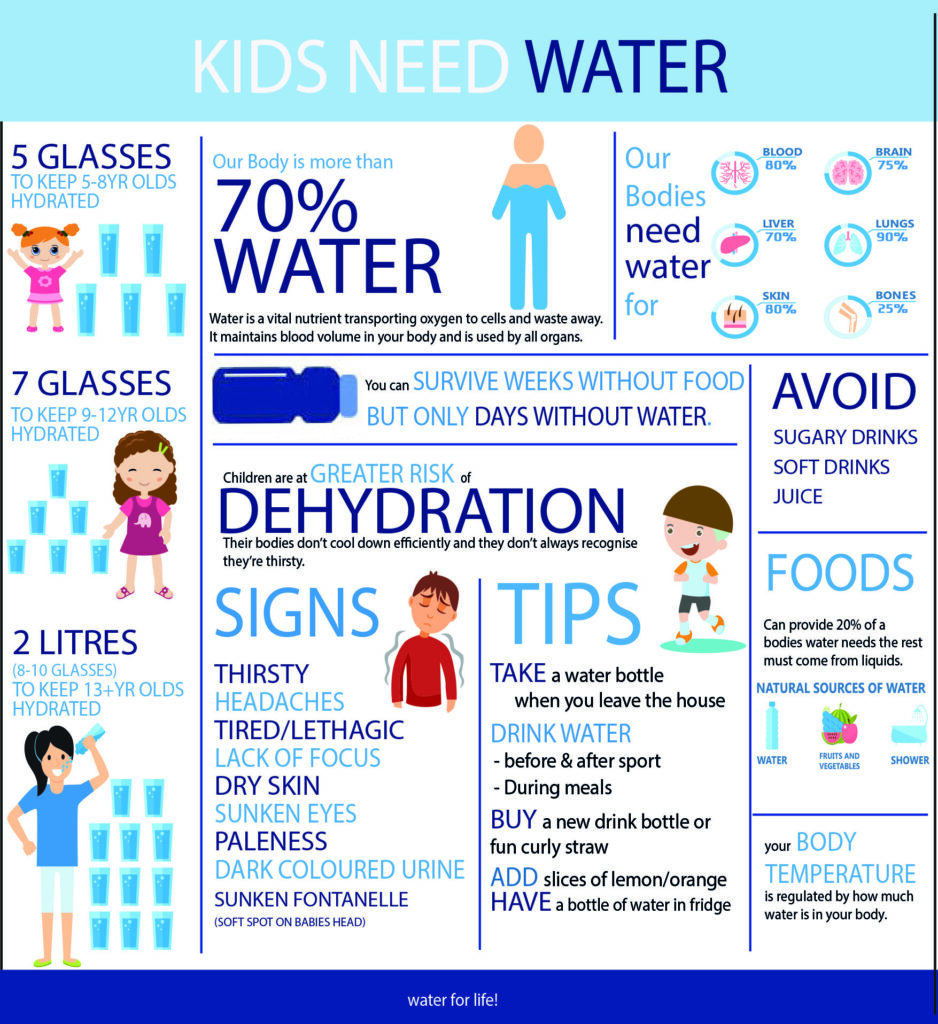
7. BUGS
While most mosquito bites are relatively harmless, some mosquitoes can transmit diseases such as malaria, dengue, West Nile, yellow fever, and Zika. Likewise, ticks can transmit Lyme disease, ehrlichiosis, Rocky Mountain spotted fever, and tularemia. Avoid stagnant water and heavily wooded areas– this is where insects like to congregate. When you are outdoors, guard your family against insect-related illnesses by applying repellents with DEET to children over six months old. Higher concentrations of DEET protect for longer lengths of time, so choose a concentration based on how long you need to protect yourself. If you plan to be in a wooded or grassy area, wear pants and long sleeves. Shower once you’re back inside to wash away repellent and any ticks that haven’t yet latched onto your body. You’ll also want to be sure to check your entire body thoroughly for ticks (especially your ears, waist, head, belly button, arms and legs).
Know the signs of having a potentially dangerous allergic reaction to a bite. Reactions are most commonly associated with stings by bees, wasps or hornets. Hives, swelling (of the face, eyes, tongue and lips), throat tightness, difficulty breathing, vomiting or feeling faint/lightheaded are all signs of potentially dangerous anaphylaxis, and you should contact your doctor immediately or call 911.
VIEW INSECT AND OTHER SKIN CARE SAFETY INFO ON OUR BLOG

8. IMMUNIZATIONS
Many parents schedule their children’s well-child visits during the summer months to prepare for the start of a new school year. Well-child visits are important to a child’s overall health because they help track development and provide clinicians a time to share wellness guidance and advice. Well-child visits are a great opportunity for providers to help parents ensure their child’s vaccinations are up to date, and to keep young patients healthy and free from vaccine-preventable illnesses throughout the school year. Missing immunizations can put both your child and community at risk. If you’ve delayed your well-child visit due to COVID-related concerns, now is the time to schedule your appointment.
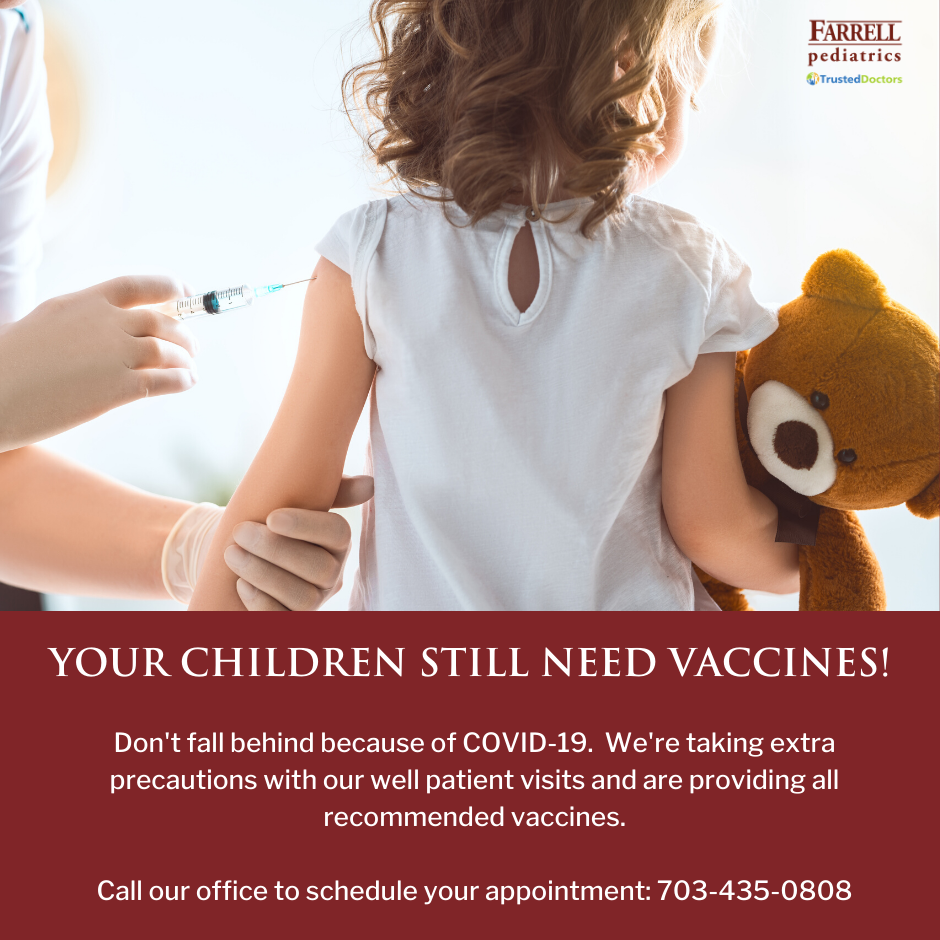
READ MORE SUMMER SAFETY TIPS ON OUR BLOG.



